The latest:
- India to hold national college tests amid concerns about surging virus infections.
- Vatican says faithful will be readmitted to Pope Francis’s weekly general audiences starting Sept. 2.
- Kenyan president extends nationwide curfew by 30 days.
- South Korea orders doctors to stop strike amid coronavirus crisis.
- Lawsuit alleges B.C.’s back-to-school plan ‘endangers’ students, teachers and public.
- Quebec won’t use COVID-19 Alert notification app for now.
- Berlin bans weekend protests against anti-virus measures.
- Gaza man dies of coronavirus as enclave clamps down on outbreak.
- Japanese researchers say ozone effective in neutralizing coronavirus.
More than two million Indian students will sit for admission tests to medical and engineering schools next week, the government said on Wednesday, despite growing concern that the move could fuel a jump in coronavirus infections.
India has been recording more than 60,000 new infections per day for the last two weeks, reaching a peak of 69,652 cases on Aug. 19. With 3.2 million cases, it ranks after the United States and Brazil, though its 59,449 deaths are far fewer.
Now the government is pushing for a return to normalcy to lessen the economic pain, after having imposed a strict early lockdown of India’s 1.3 billion people in March.
“We are very mindful of the safety of our students; we will take full precautions,” Education Minister Ramesh Pokhriyal told state radio, adding that the tests had to be held to ensure students did not lose a year.

Already twice postponed this year, the tests will be spread over several days and held at more centres than usual, to ensure there is no crowding.
But many students have to travel long distances and there was a risk of infections, said the All-India Students’ Union, a leftist group that represents university students.
It urged students to wear black armbands and join online protests to put pressure on the government to delay the tests until infections fall.
Swedish climate activist Greta Thurnberg also waded into the dispute on Twitter, urging a postponement in light of the pandemic and as parts of eastern India struggle with floods caused by annual monsoon rains.
It’s deeply unfair that students of India are asked to sit national exams during the Covid-19 pandemic and while millions have also been impacted by the extreme floods. I stand with their call to <a href=”https://twitter.com/hashtag/PostponeJEE_NEETinCOVID?src=hash&ref_src=twsrc%5Etfw”>#PostponeJEE_NEETinCOVID</a>
—@GretaThunberg
Meanwhile, Indian plans to double coronavirus testing in New Delhi as the Indian capital’s caseload has started rising again, with experts warning against complacency and a resurgence of the outbreak.
State Chief Minister Arvind Kejriwal said Wednesday that the capital was conducting 20,000 tests every day and the capacity would be increased to 40,000.
New Delhi was the first major hot spot in the country to have successfully reined in the outbreak last month, but cases have been climbing recently.
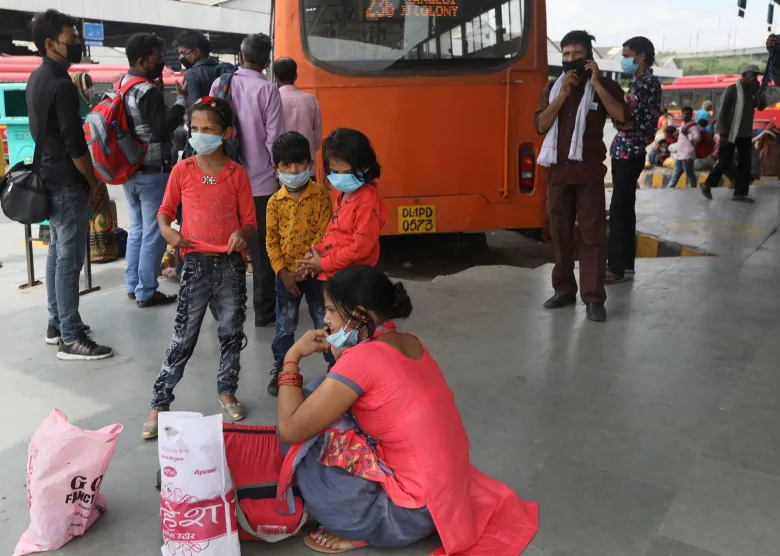
India has reported more than 67,000 new coronavirus cases in the past 24 hours. The number of infections has risen by 1.5 million since the start of the month.
The country’s health ministry on Wednesday also reported 1,059 deaths in the past 24 hours, taking total fatalities from the pandemic to 59,449.
The ministry said India’s recovery rate was now around 76 per cent with a fatality rate of 1.84 per cent.
Even though the country has been slowly opening up to heal the economy, areas identified as most affected by the virus continue to remain under lockdown.
What’s happening with coronavirus in Canada
As of 10:45 a.m. ET on Wednesday, Canada had 126,058 confirmed and presumptive coronavirus cases. Provinces and territories listed 112,167 of those as recovered or resolved. A CBC News tally of deaths based on provincial reports, regional health information and CBC’s reporting stood at 9,126.
In British Columbia, a lawsuit has been filed in B.C. Supreme Court in a bid to stop the provincial government from reopening kindergarten to Grade 12 classes unless tougher COVID-19 safety measures are imposed.
The action lists alleged “failures” in the back-to-school plan, including the failure to impose mandatory face masks, implement physical distancing, reduce class sizes and provide all students with the option of virtual learning.
WATCH | Doctors answer questions about schools reopening amid COVID-19:
The suit labels the current plan — to allow the full–time return of nearly all of B.C.’s 591,000 elementary and secondary school students on Sept. 10 — “nonsensical,” “unconscionable,” and one that “not only endangers the lives of students and teachers, but also that of the broader community.”
The application seeks an immediate injunction to restrain the B.C. ministries of health and education from reopening schools, and calls for a judicial review of the government’s plan.
Quebec, meanwhile, won’t use a smartphone application to notify the public about potential exposure to COVID-19 for now, arguing its testing and contact-tracing capability are sufficient at this stage of the pandemic.
While the province is not closing the door on using an app in the future, Premier François Legault said he would rather use one that was developed in Quebec.
“We would prefer a Quebec company, but I don’t think this is our main argument,” Legault said Tuesday afternoon in Saint-Hyacinthe, Que.
WATCH | Canadians urged to use COVID Alert app:
He said there is a lack of broad support for such an app in the province, due to privacy concerns.
“Maybe in six months we will come to another decision,” he said.
The decision puzzled the federal health ministry. Thierry Bélair, a spokesperson for Health Minister Patty Hajdu, pointed out that the app offered by the federal government, COVID Alert, does not track a user’s location nor collect any other personally identifiable information.
“It’s also an additional tool we can use as we prepare for a possible increase in cases this fall. So why not make it available now in Quebec?” said Bélair.
In Ontario, Premier Doug Ford said the province’s advertising blitz touting its back-to-school plan will continue despite opposition calls to redirect the campaign costs toward keeping students safe amid the COVID-19 pandemic.
WATCH | Ford says Ontario ‘far ahead’ in handling COVID-19:
“Imagine if we didn’t have any ads and nobody knew what was going on? That would be terrible,” Ford said at his daily COVID-19 briefing Tuesday afternoon.
He did not say how much the the newly released radio, online and print ads are expected to cost, but said they were necessary to keep parents informed about the school reopening plans.
Here’s what’s happening around the world
According to a tally kept by Johns Hopkins University, the global total of confirmed coronavirus cases is now more than 23.9 million. More than 820,000 people have died, while 15.6 million have recovered.
In Italy, a Vatican statement on Wednesday said that the faithful will be readmitted to Pope Francis’s weekly general audiences from Sept. 2, as the Holy See slowly lifts restrictions imposed due to the coronavirus pandemic.
Thousands of people traditionally attend the weekly Wednesday gatherings, but the Vatican shut out the public in March, following the COVID-19 outbreak in Italy, with the Pope instead making his address via a video link.
The Vatican said that from next week he would hold the audience in the San Damaso Courtyard of the Apostolic Palace, adding that anyone could attend.
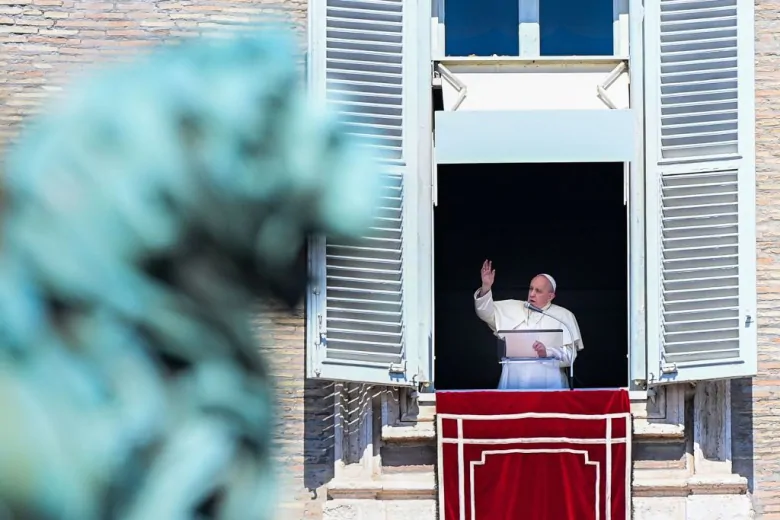
In his video address on Wednesday, the Pope said the pandemic had aggravated social inequalities, with some children seeing their education interrupted and poorer nations lacking the resources to help them deal with the crisis.
Authorities in Germany’s capital on Wednesday banned several protests planned for the weekend against coronavirus pandemic measures. The protests have drawn support from the German far right.
Officials said that those protesting in Berlin would likely have breached rules on social distancing designed to stop the spread of the virus. Germany has seen an upswing in infections in recent weeks and the government is considering whether to impose fresh restrictions again.
Authorities in the capital cited a rally against COVID-19 restrictions on Aug. 1 during which participants ignored mask-wearing and distancing rules and other conditions imposed on the protest.
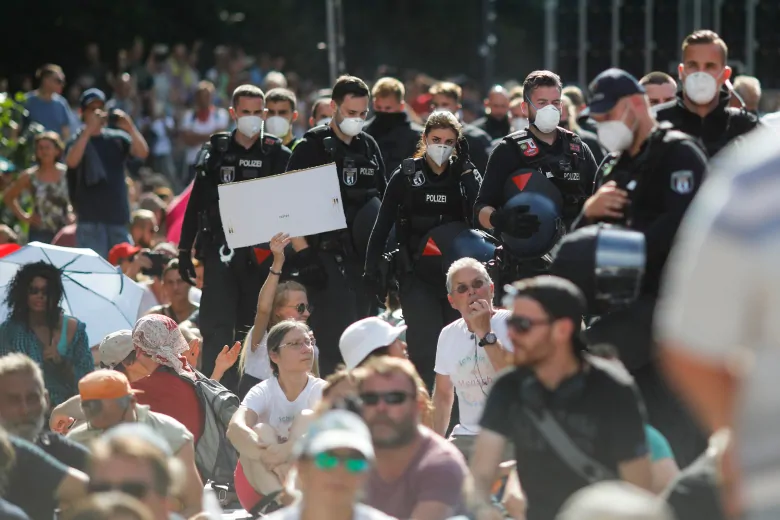
Also on Wednesday, Germany’s health minister says the country will end mandatory virus tests for travellers returning from high-risk areas and refocus its testing strategy on people with symptoms or possible exposure to COVID-19 patients.
German coalition parties agreed on Tuesday to extend measures to cushion the effects of the coronavirus crisis on Europe’s biggest economy at a cost of up to 10 billion euros ($15.6 billion Cdn), including prolonging a short-time work scheme and freezing insolvency rules.
Kenya’s President Uhuru Kenyatta on Wednesday extended a nationwide curfew by 30 days in the East African nation’s fight against the spread of the novel coronavirus.
Kenyatta said in a televised address he had also extended the closure of bars and nightclubs for 30 days, while he increased the number of people allowed to attend events such as weddings and funerals.
A 61-year-old man has died in the Gaza Strip after contracting the coronavirus, Palestinian authorities said on Wednesday as they clamped down on an outbreak in the enclave.
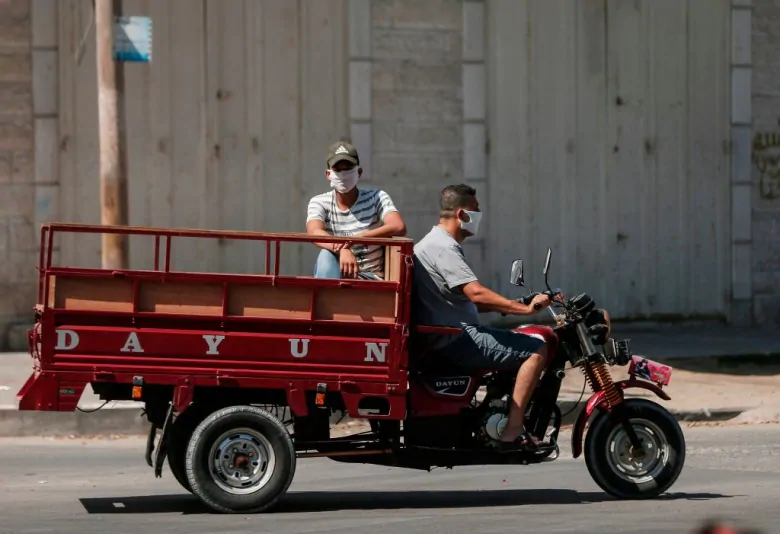
The man had suffered previous illnesses and had been on a respirator, the health ministry said. It was the first death among the general population since an infected woman died at a quarantine centre in March.
Health officials said nine more cases were discovered on Wednesday. Six of them were in the isolated Maghazi refugee camp, where the territory’s first four cases had been confirmed on Monday, prompting Gaza’s Hamas authorities to impose a full lockdown.
The three other cases were in northern Gaza Strip, indicating the virus has begun to spread into different areas of the enclave of two million people.
Health officials in South Korea ordered thousands of striking doctors to return to work as the country counted its 13th straight day of triple-digit jumps in coronavirus cases.
Health Minister Park Neung-hoo said those who refuse could have their licences suspended or revoked, or even face a prison term of up to three years.
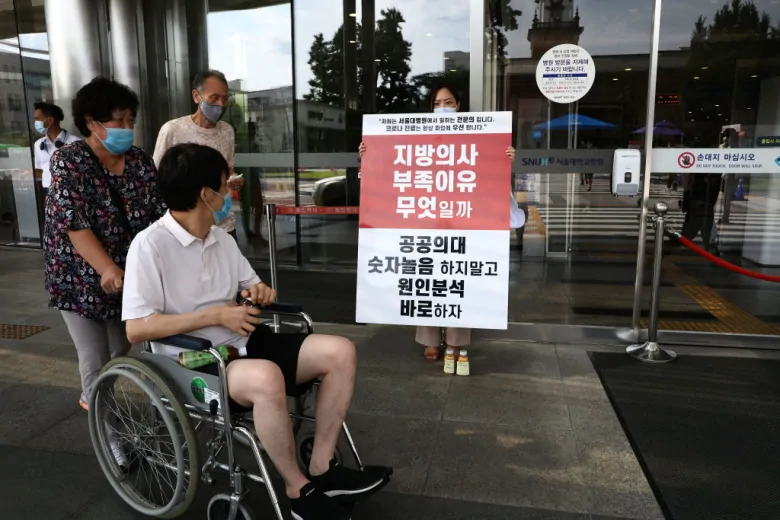
Doctors in the greater Seoul area joined physicians in other parts of the country in a three-day strike starting Wednesday against government plans to boost the number of medical students.
The government says the increase is critical for dealing with crises like COVID-19 and reducing health-care gaps between the highly developed Seoul area and the rest of the country. Doctors’ groups say the country already has enough physicians competing in a cutthroat market.
The walkouts have forced major hospitals in Seoul to reduce working hours and delay some surgeries, according to the Yonhap news agency.
WATCH | Belgium grocery stores use UV zapper to disinfect carts:
Japanese researchers said on Wednesday that low concentrations of ozone can neutralize coronavirus particles, potentially providing a way for hospitals to disinfect examination rooms and waiting areas.
Scientists at Fujita Health University told a news conference they had proven that ozone gas in concentrations of 0.05 to 0.1 parts per million (ppm), levels considered harmless to humans, could kill the virus.
The experiment used an ozone generator in a sealed chamber with a sample of coronavirus. The potency of the virus declined by more than 90 per cent when subjected to low-level ozone for 10 hours.





More Stories
Allegations of corruption Qatar warns of ‘negative impact’ of European measures
USA: Famous “Hollywood cat” euthanized in Los Angeles
The campaigner who called for the shooting of Ukrainian children has not been charged